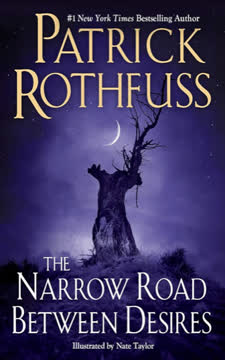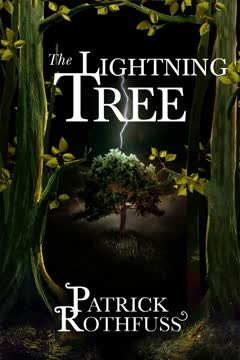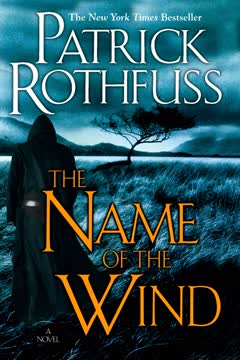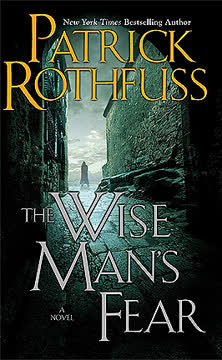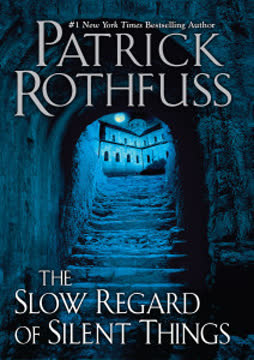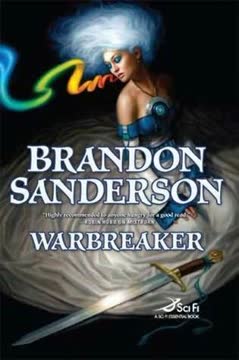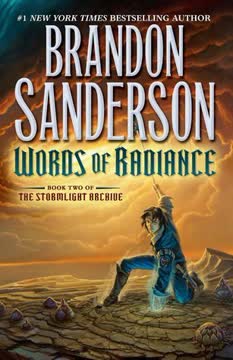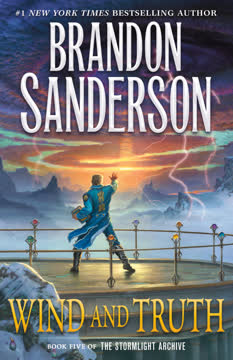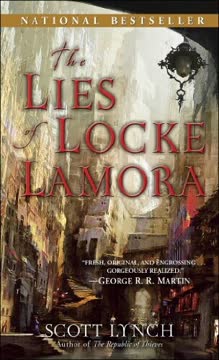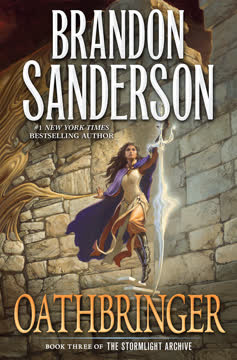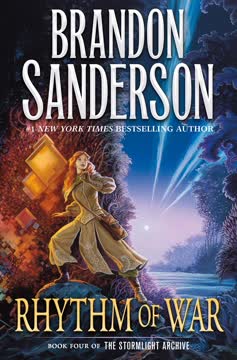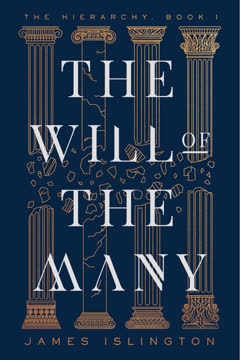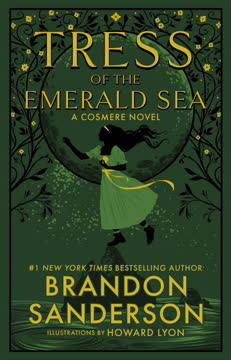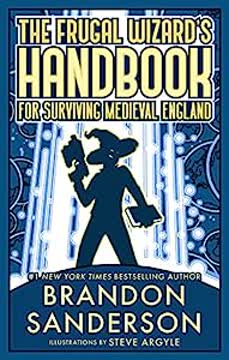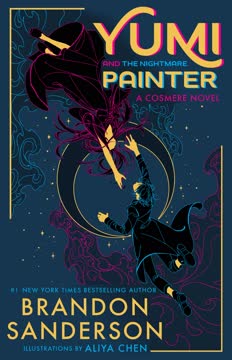Plot Summary
Dawn's Silent Escape
Bast, the enigmatic fae, attempts to slip out of the Waystone Inn at dawn, moving with the grace and cunning of a true artist. His master, the innkeeper, calls him back, grounding Bast in the mundane world with a simple request for eggs and carrots. This opening scene establishes Bast's dual nature: both otherworldly and bound by the small, human obligations of daily life. The innkeeper's gentle authority and Bast's playful, sly demeanor set the tone for a day that will be filled with secret errands, bargains, and the subtle magic that weaves through the ordinary. Bast's longing for freedom is palpable, but so is his affection for the inn and its people, hinting at the tension between his desires and his chosen constraints.
The Lightning Tree's Bargains
At the ancient lightning-struck tree, Bast becomes a figure of myth and mischief for the town's children. They come to him with their troubles—cuts, rivalries, and the need for clever lies or subtle revenge. Bast dispenses solutions, always exacting a price: a secret, a trinket, a favor. The tree itself, scarred and powerful, is both a symbol and a tool, a place where the rules of the world bend. Bast's interactions are playful but edged with the seriousness of fae bargains; every exchange is a lesson in the cost of desire. The children's needs are small, but the rituals and rules Bast enforces give their problems weight, and the tree becomes a crossroads of innocence and cunning.
Children's Secrets and Lies
Bast's morning is a parade of children, each with a secret or a need. He crafts lies for the baker's daughter, plots subtle revenge for a jealous boy, and collects oddments—stones, string, and stories. These exchanges are not just games; they are the currency of trust and power in the small world of Newarre. Bast's role is ambiguous: part confessor, part trickster, part protector. The children's willingness to trade their secrets for his help reveals both their vulnerability and their faith in his magic. Through these interactions, Bast weaves himself into the fabric of the town, his fae nature hidden beneath the guise of a helpful, if mischievous, young man.
Fortune Stones and Favors
Alone, Bast consults his collection of embrils—fortune-telling stones, each carved or painted with symbols. He casts them, seeking guidance, and interprets their patterns with a mix of intuition and ritual. The stones are both a comfort and a reminder of the uncertainty that governs his life. They connect him to the deeper magic of the world, but also to the randomness of fate. Bast's readings are interrupted by errands and distractions, but the act of casting the stones grounds him, offering a moment of stillness amid the day's chaos. The embrils become a motif for the choices and consequences that shape the story.
Shepherd's Song and Desire
Bast's path leads him to a secluded valley, where he crafts a set of shepherd's pipes and plays a tune that is both playful and enchanting. His music weaves through the air, stirring desire and delight in a young shepherd, though the boy remains oblivious to Bast's presence. The scene is charged with longing and the bittersweet pleasure of unfulfilled desire. Bast's artistry is evident not just in his music, but in the way he orchestrates the world around him, drawing beauty and meaning from the ordinary. This interlude reveals Bast's loneliness and his yearning for connection, even as he remains apart, a creature of both longing and restraint.
The Gift of Obligation
Bast's day is disrupted when Kostrel, a clever boy, presents him with a mysterious brass token—a penance piece—on behalf of Rike, a troubled child. Accepting the gift, Bast is struck by a sudden, heavy sense of obligation, a binding that is both magical and psychological. The rules of fae gifts are strict: to accept is to be beholden, and Bast finds himself ensnared by a debt he did not choose. The penance piece, bright and old, carries the weight of forgiveness and atonement, but also the danger of unintended consequences. Bast's frustration and vulnerability are palpable, as he navigates the narrow road between his own desires and the obligations imposed by others.
Riddles and Revelations
Kostrel, ever the bargainer, trades valuable information with Bast: the secret of where Emberlee, the prettiest girl in town, takes her bath. In exchange, Kostrel demands honest answers about the Fae. Bast, wary but intrigued, agrees, and the two engage in a dance of questions and answers, each probing the other's knowledge and motives. The exchange is playful but edged with real risk, as Kostrel's curiosity threatens to uncover truths Bast would rather keep hidden. The riddles and revelations exchanged here deepen the bond between the two, but also highlight the dangers of knowledge and the power of secrets.
The Penance Piece
The penance piece, a small brass token, becomes a focal point for Bast's internal struggle. It is a symbol of guilt, forgiveness, and the complex web of debts that bind people together. Bast's acceptance of the gift from Rike, mediated by Kostrel, forces him to confront the limits of his freedom and the responsibilities he cannot escape. The piece is both a blessing and a curse, offering the possibility of redemption but also the risk of being trapped by another's need. Bast's musings on the nature of obligation reveal the depth of his longing for autonomy, and the pain of being caught between his own desires and the needs of others.
The Fae and Their Magic
In response to Kostrel's questions, Bast explains the nature of the Fae: their magic, their rules, their capacity for both glamourie (seeming) and grammarie (being). He describes the subtle ways in which the Fae shape the world, their love of places where the elements meet, and their ability to hide in plain sight. The conversation is both a lesson and a warning, as Bast reveals the dangers of fae bargains and the difficulty of distinguishing truth from illusion. The magic of the Fae is not just power, but a way of seeing and shaping reality, a narrow road between desire and restraint.
The Boy Who Needed Help
Rike, a boy marked by bruises and fear, comes to Bast with a plea: he wants his abusive father gone, but cannot bring himself to commit murder. The request is both heartbreaking and fraught with moral complexity. Bast, bound by obligation and his own code, agrees to help, but insists on a price: Rike will owe him, body and soul, until the debt is paid. The bargain is sealed with blood and ritual, binding both boy and fae in a pact that is as much about hope as it is about desperation. The scene is raw and honest, exposing the darkness that can lurk beneath the surface of ordinary lives.
Blood and Binding
The ritual at the lightning tree is both simple and profound: blood is shed, words are spoken, and the world shifts. Bast and Rike enact the ancient forms of fae binding, circling the tree, pressing bloody hands to its pale trunk, and invoking the power of names and promises. The act is both magic and psychology, a way of making desire real and binding it to the world. The repetition of the ritual, the circling and the words, reinforce the seriousness of the bargain and the weight of the consequences. In this moment, the boundaries between fae and mortal, desire and duty, blur and intertwine.
The Narrow Road Between Desires
Bast's day is a constant negotiation between what he wants and what he must do. He helps children, pursues his own pleasures, and fulfills the obligations imposed by bargains and gifts. Each choice is a step along the narrow road between desire and responsibility, freedom and connection. The story's structure mirrors this tension, as Bast moves from one encounter to the next, always balancing his own needs against those of others. The lightning tree, with its charred and living wood, stands as a symbol of this balance: beauty and ruin, power and vulnerability, all entwined.
Sweetness and Small Kindnesses
Amid the day's trials, Bast finds moments of sweetness: splitting wood for a tired mother, sharing honeycomb with a child, weaving a crown of daisies. These small acts of kindness are both genuine and strategic, ways of building goodwill and repaying debts. Bast's interactions with the townsfolk reveal his capacity for empathy and his longing for connection, even as he remains apart. The sweetness he brings into the world is hard-won, a product of patience and effort, and it stands in contrast to the darker bargains and obligations that also shape his day.
The Art of Stillness
As evening falls, Bast finds himself restless, unable to settle. He consults his embrils, seeking guidance, but the answers are ambiguous. The stillness of the moment is both a respite and a challenge, forcing Bast to confront the consequences of his actions and the limits of his power. The day's events have left him both satisfied and unsettled, his desires fulfilled in part but also complicated by new obligations. The art of stillness, like the art of desire, is a skill Bast must continually practice, balancing action with reflection, movement with rest.
The Making of a Charm
Bast guides Rike through the creation of a charm to protect his mother—a river stone, a borrowed needle, blood, and beeswax. The process is both magical and deeply personal, a way of transforming fear and pain into hope and safety. Bast's instructions are precise, blending fae tradition with practical wisdom. The charm is more than an object; it is a manifestation of love and the desire to protect. Through the ritual, Rike is given agency, a way to act in the face of helplessness, and Bast fulfills his own need to help, even as he remains bound by the rules of his kind.
The Demon's Bargain
The consequences of Bast's bargains ripple through the town: Jessom, Rike's father, is driven away by a series of misfortunes, and the townsfolk speculate about the cause. Bast's role is hidden, but the effects of his magic are real. The cost of the bargain is not just paid by Rike, but by Bast as well, who must bear the weight of the boy's pain and the knowledge of what he has done. The demon's bargain is both a blessing and a curse, offering relief but also exacting a price. The story lingers on the ambiguity of justice and the limits of power.
Midnight Lessons
At midnight, Bast returns to the lightning tree to complete the ritual with Rike. He leads the boy through a series of affirmations, stripping away the shame and self-hatred that have taken root in Rike's heart. The lesson is both magical and psychological: you are not your worst deeds, you are not doomed to repeat the sins of your father, you are worthy of love. Bast's words are a balm, a way of healing wounds that magic alone cannot touch. The scene is intimate and transformative, a testament to the power of kindness and the possibility of change.
The Good Wolf's Truth
In the quiet aftermath, Bast reflects on the lessons of the day. He is, in his own way, a good wolf: a creature of power who chooses to use his gifts for kindness rather than harm. The story closes with Bast and the innkeeper sharing a simple meal, the day's troubles receding into the background. The final truth is not one of grand heroics or epic battles, but of small mercies, gentle wisdom, and the courage to choose love over fear. Bast's journey is not about conquering the world, but about finding a place within it, and making it a little sweeter, a little safer, for those who need it most.
Characters
Bast
Bast is a fae creature living in the human world, serving as the innkeeper's assistant and confidant. He is both mischievous and deeply empathetic, a master of subtle magic and social manipulation. Bast's relationships with the children of Newarre reveal his dual nature: he is both protector and tempter, offering help but always at a price. Psychologically, Bast is torn between his desire for freedom and his need for belonging; he craves connection but fears the vulnerability it brings. Over the course of the story, Bast's actions are shaped by his struggle to balance his own desires with the obligations imposed by fae bargains and human affection. His development is marked by moments of genuine kindness, self-doubt, and the hard-won wisdom of choosing gentleness over power.
Rike
Rike is a troubled child, marked by the physical and emotional scars of an abusive father. His desperation leads him to seek Bast's help, not for revenge, but for the hope of a life free from fear. Rike's relationship with Bast is fraught with tension: he is both client and supplicant, bound by the rules of fae bargains but also by his own sense of guilt and unworthiness. Psychologically, Rike is haunted by the fear that he will become like his father, and his journey is one of self-forgiveness and the reclamation of agency. Through his interactions with Bast, Rike learns to articulate his desires, confront his fears, and accept the possibility of change. His development is a testament to the resilience of the human spirit and the transformative power of kindness.
Kostrel
Kostrel is a sharp-witted, curious boy who delights in trading secrets and favors with Bast. He is both a foil and a friend, challenging Bast with his questions and refusing to be easily deceived. Kostrel's psychological makeup is defined by his hunger for knowledge and his willingness to test boundaries. He is fearless in his pursuit of the truth, but also capable of empathy and loyalty. His relationship with Bast is one of mutual respect and playful rivalry, each pushing the other to greater honesty and self-awareness. Kostrel's development is marked by his growing understanding of the complexities of magic, desire, and the cost of secrets.
The Innkeeper (Reshi/Kvothe)
The innkeeper, known as Reshi to Bast, is a figure of quiet authority and deep weariness. He is both Bast's master and his friend, providing structure and stability in a world that often feels chaotic and dangerous. Psychologically, the innkeeper is marked by a profound sense of loss and resignation, but also by a stubborn commitment to kindness and order. His relationship with Bast is complex: he is both caretaker and jailer, offering protection but also imposing limits. Over the course of the story, the innkeeper's presence serves as a grounding force, reminding Bast of the value of small, everyday acts of care and the importance of community.
Emberlee
Emberlee is a young woman whose beauty and independence make her the subject of both admiration and gossip. She is the focus of Bast's playful schemes and Kostrel's secrets, but she is also more than an object: she is clever, self-possessed, and capable of turning the tables on those who seek to use her. Psychologically, Emberlee represents the complexity of desire and the agency of those who are often objectified. Her interactions with Bast and Kostrel reveal her wit and her willingness to participate in the games of secrecy and revelation that define the town's social life.
Nettie Williams
Nettie is Rike's mother, a woman worn down by hardship but still capable of warmth and resilience. She is the silent center of her family, holding things together in the face of her husband's violence and absence. Psychologically, Nettie is marked by exhaustion and worry, but also by a deep well of love for her children. Her interactions with Bast are marked by gratitude and a cautious hope, as she accepts his help without fully understanding its nature. Nettie's presence in the story is a reminder of the quiet heroism of those who endure and protect, even when the world offers little comfort.
Viette
Viette, the mayor's youngest daughter, is a precocious and determined child who seeks Bast's help with her "magic kitten." She is both innocent and shrewd, quickly grasping the rules of fae bargains and holding her own in negotiations. Psychologically, Viette is marked by a fierce sense of justice and a willingness to challenge authority. Her interactions with Bast foreshadow her potential to become a formidable player in the games of secrets and power that define the town. Viette's development is a testament to the resilience and adaptability of children, and the ways in which they learn to navigate a world shaped by adult desires.
The Children of Newarre
The children who come to Bast for help represent the spectrum of innocence and cunning that defines the town. Each brings their own troubles, secrets, and desires, and each learns something from their encounters with Bast. Psychologically, the children are marked by vulnerability, curiosity, and a willingness to trust in magic. Their development is shaped by the lessons Bast imparts: the cost of lies, the value of secrets, and the importance of agency. Collectively, they embody the hope and potential of the next generation, even as they are shaped by the bargains and betrayals of the present.
Jessom Williams
Jessom is Rike's abusive father, a figure whose presence looms over the story even in his absence. He is the catalyst for Rike's desperation and the target of Bast's magic. Psychologically, Jessom represents the cycle of violence and the ways in which trauma is passed from one generation to the next. His removal from the story is both a relief and a source of lingering anxiety, as the consequences of his actions continue to shape the lives of those he leaves behind.
Crazy Martin
Martin is the town's eccentric distiller, feared and avoided by most. He is both a source of danger and a figure of unexpected kindness, his madness masking a deeper understanding of the world. Psychologically, Martin represents the limits of social order and the ways in which those who do not fit are both marginalized and essential. His interactions with Bast and the townsfolk reveal the complexity of community and the necessity of making space for difference.
Plot Devices
The Lightning Tree
The lightning tree is both a literal and symbolic center of the story, a place where the rules of the world are bent and bargains are struck. It serves as a gathering place for the children, a site of ritual for Bast, and a conduit for the magic that shapes the narrative. The tree's scarred, living wood embodies the tension between ruin and renewal, power and vulnerability. Its presence grounds the story in a specific place, while also connecting it to the larger currents of fate and desire that run through the world.
Embrils (Fortune Stones)
The embrils are small, carved or painted stones used for fortune-telling and divination. They serve as both a plot device and a metaphor for the uncertainty and complexity of life. Bast's use of the embrils reflects his need for guidance and his desire to impose order on chaos. The stones' ambiguous meanings mirror the story's themes of ambiguity, choice, and the limits of knowledge. Their presence in the narrative reinforces the idea that every action has consequences, and that the future is always in flux.
Fae Bargains and Obligations
The rules of fae bargains—gifts, debts, and the binding power of words—are central to the story's structure. Every exchange, whether of secrets, favors, or objects, carries a weight that must be balanced. The acceptance of a gift creates obligation; the making of a promise invokes magic. These rules shape the interactions between Bast and the townsfolk, and drive the plot forward. The tension between freedom and obligation, desire and duty, is embodied in the rituals and bargains that define the fae way of being.
Narrative Structure
The story unfolds over the course of a single day, structured around the passage of time from dawn to midnight. This structure allows for a layering of events, as Bast moves from one encounter to the next, each building on the last. The cyclical nature of the day mirrors the rituals and repetitions of fae magic, and reinforces the themes of continuity and change. The narrative is both episodic and cumulative, with each chapter adding depth and complexity to the overarching story.
Foreshadowing and Symbolism
The story is rich with foreshadowing and symbolism: the lightning tree, the embrils, the penance piece, and the rituals of binding all point to deeper truths about the nature of desire, power, and transformation. The repeated motifs of circles, blood, and bargains hint at the cycles of trauma and healing that shape the characters' lives. The use of symbols allows the story to operate on multiple levels, inviting readers to look beyond the surface and consider the hidden currents that drive the narrative.
Analysis
Patrick Rothfuss's The Narrow Road Between Desires is a masterful meditation on the interplay between longing, obligation, and the small acts of kindness that shape our lives. Through the figure of Bast—a fae caught between worlds, desires, and duties—the story explores the cost of magic, the power of secrets, and the redemptive potential of empathy. The narrative's structure, unfolding over a single day, allows for a deep immersion in the rhythms of ordinary life, even as it is shot through with the extraordinary. The lightning tree stands as a potent symbol of the crossroads we all face: the choice between self-interest and service, vengeance and forgiveness, isolation and connection. Rothfuss's prose is both lyrical and precise, capturing the beauty and pain of being alive. The story's true magic lies not in grand gestures or epic battles, but in the quiet courage to choose love, to heal, and to hope. In a world that often valorizes violence and power, The Narrow Road Between Desires offers a gentler, wiser vision: that the greatest strength lies in the willingness to be kind, to listen, and to walk the narrow road between our own desires and the needs of others.
Last updated:
Review Summary
The Narrow Road Between Desires receives mixed reviews, with some praising Rothfuss's beautiful prose and expansion of Bast's character, while others criticize it as a rehash of a previously published story. Many express frustration with the author's long delay in completing the Kingkiller Chronicle trilogy. Some appreciate the added illustrations and deeper exploration of the world, while others find the changes unnecessary or forced. The book's reception is heavily influenced by readers' feelings about Rothfuss's overall publishing history and promises to fans.
